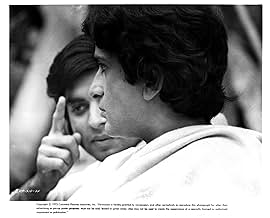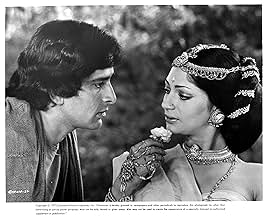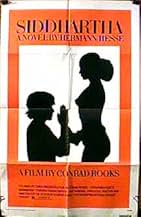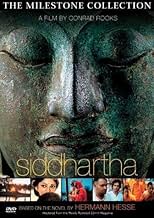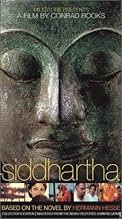NOTE IMDb
6,6/10
1,3 k
MA NOTE
Ajouter une intrigue dans votre langueThe story of a young Indian who embarks upon a journey to find the meaning of existence. Based on the novel by Hermann Hesse.The story of a young Indian who embarks upon a journey to find the meaning of existence. Based on the novel by Hermann Hesse.The story of a young Indian who embarks upon a journey to find the meaning of existence. Based on the novel by Hermann Hesse.
- Réalisation
- Scénario
- Casting principal
Avis à la une
This film is stunning in its beauty. The music is transcendent. For the longest time I tried to get the soundtrack. To save you the trouble, be aware that they never made one! There is one scene in which a woman blows on a shell that was so powerful I still remember 30 years later. Mesmerizing. If you have not seen it yet, rent it today.
10movinut
I saw the movie twice, the first time in Sweden in 1974; I had read Herman Hesse's book before that, and the story had strongly impressed me. The movie was even better then the book! the photography was very poetic, the music (indian flutes, tablas) was very high in the aesthetics band, and the story conformed more or less with the book, but without taking away any of it's impact. there were 12 people in the theatre, and at the end as the credits were scrolling for what seemed at least 20 minutes, no-one moved from their seats as transfixed by what they had just seen. I am sure that all 12 of those people recall to this day the effect that this film created on them. I am not a Buddhist or even very religious, but i personally recommend it as part of a person's education in life....
It would be easier to write the following comment if the copyright owners, made the film accessible to individual consumers...I`m trying to remember the thematics of this film!! I saw this film 2 years ago on the big screen. This film is far from being about a pointless quest, those are words of a mind that has lost the way , the way to self knowledge, through such questions as: "who am i?"" where did i come from?", and "where am i going?". These might seem irrelevant to the impatient mind but given ample time, the relevancy to all people will become very apparent. What this film conveys is one man`s journey on such a path of "self"knowledge. An indepth appreciation of indian thought or , philosophy or likewise may prove invaluable in terms of understanding , some of the seemingly fleeting or trivial scenes, or more culturally esoteric moments in the film, thus,enabling one to be more fully consummated by its story, however I am sure it is not a prerequisite for the artfully minded!. Among the the features of this film, is the music, of a musician singer who is legendary in India(I cant remember his name right now!)and is certainly legendary in this film, and is certainly a beautiful record of the 'Indian' spirituality alive and breathing to this day in India. If anyone can tell me where i can get the soundtrack or some compilation of the music in this film i would be very appreciative, (this request is a long standing one)
This film would appeal to those people who see or find or sense themselves on a similar"path" or quest, and may give much confirmation or food for thought about the possible turning points, or unknown or unexpected "detours" that one finds themselves engaged in along the way. This film offers a message, a very sound message about the quest of the human spirit its struggle for higher fulfillment, which i add Is the quest of the human being.
This film would appeal to those people who see or find or sense themselves on a similar"path" or quest, and may give much confirmation or food for thought about the possible turning points, or unknown or unexpected "detours" that one finds themselves engaged in along the way. This film offers a message, a very sound message about the quest of the human spirit its struggle for higher fulfillment, which i add Is the quest of the human being.
No movie that is even marginally true to the story that Nobel Prize-winning German author Hermann Hesse told in his novel Siddhartha (1951) is without merit; and this modest film is no exception. The problem is, that while Conrad Brooks, who wrote, directed and produced the film, is true to the storyline of the novel and even in some respects true to the spirit of the novel, he fails to bring the power and the resplendence of Hesse's philosophic and spiritual masterpiece to the screen.
What made the novel one of the best ever written is the character of Siddhartha himself. Patterned after the Buddha both in temperament and in experience, Hesse's Siddhartha, "the Accomplished One," grew up amid extravagant wealth and privilege only to dump it all in an effort to find himself. Brooks fails almost immediately when he leaves out the scene from the book in which the young Siddhartha, not wanting to directly disobey his father (and to demonstrate his resolve) stands up all night waiting patiently for his father's permission to leave their splendid estates. This is one of the great "coming of age" scenes ever written and an early insight into Siddhartha's strength of character, but Brooks gives it barely a notice! Also skirted over too quickly are Siddhartha's years with the samanas in the forest where he practiced meditation and austerities. This part of Siddhartha's life was essential in making him the man he was and in showing us his character. He spent six years with the shamans and gurus of the forest (along with his companion Govinda) and in the end learned everything they knew and more, and yet had not found the answer he sought. (This parallels the experience of the "emaciated" Buddha.) Brooks does do the meeting with the Buddha well, having us hear his voice but not see him, and then follows that up with Siddhartha's reasons for not following the Buddha, even though he finds no fault with the Enlightened One's teachings. Note that without his actually meeting the Buddha, the life of Siddhartha (which is one of the traditional names of the Buddha) would so closely parallel that of the Buddha that some people might think that Hesse had written a profane life of the Buddha, which might not set well with some Buddhists! (Of course we all have the Buddha nature.) Siddhartha's life with the courtesan Kamala and the merchant Kamaswami and his spiral into debauchery and sloth is well depicted, although again the ultimate disillusionment that Siddhartha experienced is not as well presented as in the novel. Which brings me to Shashi Kapoor who plays Siddhartha. Although he would go on to be the veteran of well over a hundred films, and although he is appropriately enough Indian as well as tall, dark and handsome and a good actor, he fails to evoke the passion that Siddhartha must have. Siddhartha felt everything in a profound manner, even boredom was profoundly experienced by the Brahmin's prodigal son. Kapoor, especially near the end of the film when he plays an old man, occasionally made me feel that he could be "the Accomplished One," but more often he made me feel that he was holding something back.
Finally, the poetic scene near the end of the novel when, after living with and being guided by Vasudeva, the ferryman, Siddhartha becomes one with the river and falls spiritually into its wisdom, is only a bland shadow of what appears in the novel! Part of the reason for the failure probably has to do with a limited budget. The film is 83 minutes long, but could easily be twice that long. Part has to do with the selection of scenes and the emphasis on those scenes, and finally part of the reason has to do with the relative inexperience of Brooks who was only directing his second major film (and apparently his last). Certainly the on-location in India cinematography by Sven Nykvist who worked on so many films with Ingmar Berman is not to be faulted. Although not spectacular, Nykvist's camera conveys both the exotic beauty and the poverty of a landscape that could have been India 26 centuries ago.
(Note: Over 500 of my movie reviews are now available in my book "Cut to the Chaise Lounge or I Can't Believe I Swallowed the Remote!" Get it at Amazon!)
What made the novel one of the best ever written is the character of Siddhartha himself. Patterned after the Buddha both in temperament and in experience, Hesse's Siddhartha, "the Accomplished One," grew up amid extravagant wealth and privilege only to dump it all in an effort to find himself. Brooks fails almost immediately when he leaves out the scene from the book in which the young Siddhartha, not wanting to directly disobey his father (and to demonstrate his resolve) stands up all night waiting patiently for his father's permission to leave their splendid estates. This is one of the great "coming of age" scenes ever written and an early insight into Siddhartha's strength of character, but Brooks gives it barely a notice! Also skirted over too quickly are Siddhartha's years with the samanas in the forest where he practiced meditation and austerities. This part of Siddhartha's life was essential in making him the man he was and in showing us his character. He spent six years with the shamans and gurus of the forest (along with his companion Govinda) and in the end learned everything they knew and more, and yet had not found the answer he sought. (This parallels the experience of the "emaciated" Buddha.) Brooks does do the meeting with the Buddha well, having us hear his voice but not see him, and then follows that up with Siddhartha's reasons for not following the Buddha, even though he finds no fault with the Enlightened One's teachings. Note that without his actually meeting the Buddha, the life of Siddhartha (which is one of the traditional names of the Buddha) would so closely parallel that of the Buddha that some people might think that Hesse had written a profane life of the Buddha, which might not set well with some Buddhists! (Of course we all have the Buddha nature.) Siddhartha's life with the courtesan Kamala and the merchant Kamaswami and his spiral into debauchery and sloth is well depicted, although again the ultimate disillusionment that Siddhartha experienced is not as well presented as in the novel. Which brings me to Shashi Kapoor who plays Siddhartha. Although he would go on to be the veteran of well over a hundred films, and although he is appropriately enough Indian as well as tall, dark and handsome and a good actor, he fails to evoke the passion that Siddhartha must have. Siddhartha felt everything in a profound manner, even boredom was profoundly experienced by the Brahmin's prodigal son. Kapoor, especially near the end of the film when he plays an old man, occasionally made me feel that he could be "the Accomplished One," but more often he made me feel that he was holding something back.
Finally, the poetic scene near the end of the novel when, after living with and being guided by Vasudeva, the ferryman, Siddhartha becomes one with the river and falls spiritually into its wisdom, is only a bland shadow of what appears in the novel! Part of the reason for the failure probably has to do with a limited budget. The film is 83 minutes long, but could easily be twice that long. Part has to do with the selection of scenes and the emphasis on those scenes, and finally part of the reason has to do with the relative inexperience of Brooks who was only directing his second major film (and apparently his last). Certainly the on-location in India cinematography by Sven Nykvist who worked on so many films with Ingmar Berman is not to be faulted. Although not spectacular, Nykvist's camera conveys both the exotic beauty and the poverty of a landscape that could have been India 26 centuries ago.
(Note: Over 500 of my movie reviews are now available in my book "Cut to the Chaise Lounge or I Can't Believe I Swallowed the Remote!" Get it at Amazon!)
What a movie!! What a hidden gem! Can't thank a friend (VNR) enough for recommending this film. Its the ultimate soul-searching movie. "Stop searching, stop worrying, give love! Live in present. Everything changes, everything returns"! Some deep Indian philosophy in the film, presented by non-Indians primarily! I find that amazing. The music of the film by Hemant Kumar works beautifully. Very simple, melodic, mostly Bengali. Haunting. Gels so well with the river, nature depicted in the film. "O re nadi" is my favorite. The entire film has a feel reminiscent of Satyajit Ray's film making. Brilliant production. Watch this film. It will stay with you for long. Maybe a lifetime.
Le saviez-vous
- AnecdotesSimi Garewal took the boldest step in her career by going topless for a scene in this film. It was the first topless scene in the history of Bollywood and created a massive uproar. When the scene was featured on the cover of two English magazines, it created more controversy and ended up in court. The film eventually got banned in India. When asked about it years later, Garewal, who said she was never shy, revealed that she would have stripped totally naked if they had let her. In fact, she had been totally nude in front of the filming crew for Mera Naam Joker the same year, but they only showed her from the back onscreen. She said she loved the freedom of losing her inhibitions and her clothes.
- Citations
Siddhartha: I have come to say, that you are all the things that will outlive me, that you, Kamala, will be all the beauty that will be in the shadow we leave. You will be my first love, my only love.
- ConnexionsReferenced in Génération pub: Melissa and Men (1991)
- Bandes originalesMother's Song
by Shanti Hiranand
Meilleurs choix
Connectez-vous pour évaluer et suivre la liste de favoris afin de recevoir des recommandations personnalisées
- How long is Siddhartha?Alimenté par Alexa
Détails
- Date de sortie
- Pays d’origine
- Sites officiels
- Langue
- Aussi connu sous le nom de
- На пути к истине
- Lieux de tournage
- Société de production
- Voir plus de crédits d'entreprise sur IMDbPro
- Durée
- 1h 29min(89 min)
- Mixage
- Rapport de forme
- 2.35 : 1
Contribuer à cette page
Suggérer une modification ou ajouter du contenu manquant



